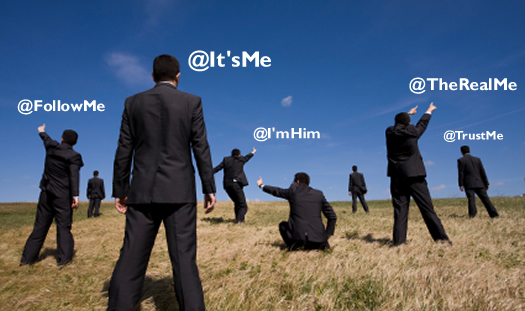
I’m going to introduce a few topics before getting into the heart of this post. As you might know already, Google released a major update to its search experience a few weeks ago, called Google Instant. With Instant, Google now changes the search results as you type your query (on the fly). That includes changing the sponsored results (paid search ads), Universal Search (blended search results), etc. This post isn’t necessarily about the changes involved with Instant, but more of a side effect of the changes.
Google suggests queries (via predicted searches) as you type your query in the search box. This is based on Google’s autocomplete algorithm. So if you started to type “Apple”, you would see suggestions like “store, vacations, trailers, and iphone.” As part of Google Instant, you can select a predicted query and Google will dynamically change the search results to match that query. This works for any query you start to type, including searching for people. Yes, that’s a little foreshadowing. :)
A Twitter handle is basically the username that you select for your Twitter account. For example, my Twitter handle is glenngabe. You don’t have to use your actual name as your handle, although it could very well help you (again, more foreshadowing).
The Increasing Trend of Searching for Twitter Handles
If you follow me on Twitter, then you probably know that I’m a big believer in the service (and I’m a very active user). When I’m in the process of checking my feeds, reading new posts and articles, and posting updates on Twitter, I always try and give authors credit for their work (by referencing their Twitter accounts in my tweets). That’s one of the reasons I firmly believe that you should provide a prominent link to your Twitter account from your website template, blog template, etc. Let’s face it, you should make it easy for people who are trying to help you. But I still find many bloggers or writers that don’t provide an easy way to find their Twitter handles. In addition, some people may have heard about you from friends or colleagues. Since they’re not on your website when they hear about you, those people might simply search for your Twitter handle. That’s where Google comes into play.
Googling Your Twitter Handle
If I can’t easily find someone’s Twitter handle on the post or site in question, I quickly visit Google and enter their name along with the keyword “Twitter”. The query looks like this:
{first-name last-name twitter}
i.e. glenn gabe twitter
And many other people are doing the same thing. I know this because Google’s autocomplete algorithm shows this type of query via its predicted searches functionality (see screenshot below). You can see this in action now by searching Google for a name of someone you want to follow and then reviewing the search suggestions. For some people, you’ll see Google recommend their name and the keyword “Twitter”. For others, you’ll need to start typing “Twitter” after their name and Google Instant will start showing the results for that query. This is where it gets interesting (or not if you aren’t active on Twitter.)
Google’s Predicted Searches Shows The Popularity of a Twitter Search:
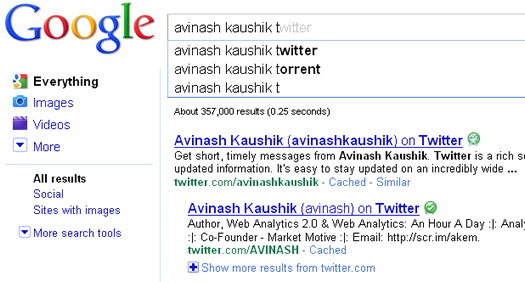
Fortunately, or unfortunately, what shows up in the search results is what people are going to check out. There are times that I end up finding the people I’m searching for. But there are times I can’t find the person I’m looking for, which often shocks me considering how Twitter has surged and how important Social Media has become. Even worse than not finding someone is seeing a Twitter account that looks like their account, but it ends up being either a squatter or some impostor. Then of course, there are people with the same name that have Twitter accounts, which can also be problematic in certain situations (if your account is not there). For example, what if they have weak profiles, no avatars (or risky avatars), questionable tweets, etc. Sometimes it’s hard to tell if a Twitter account is the one you are looking for. And what if people searching for you actually think one of those questionable accounts is yours?
Google Instant makes this process even more in-your-face, since the search results dynamically change to show you what ranks for the person you are searching for. If your Twitter account isn’t there, then the person searching for you is seeing someone else or a random search result. Needless to say, this can be problematic for you, and I cover some of the dangers below of not showing up when others search for your Twitter account.
An Example of a Search for a Person’s Twitter Account:
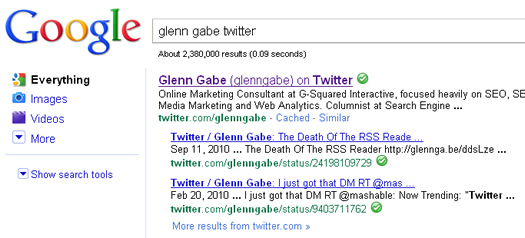
To demonstrate what can happen when you don’t show up for searches, I’ll use a celebrity so it’s overly obvious the problems that this can cause:
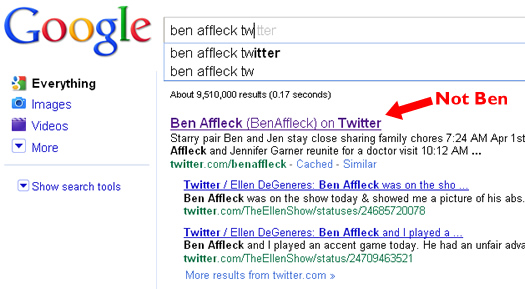
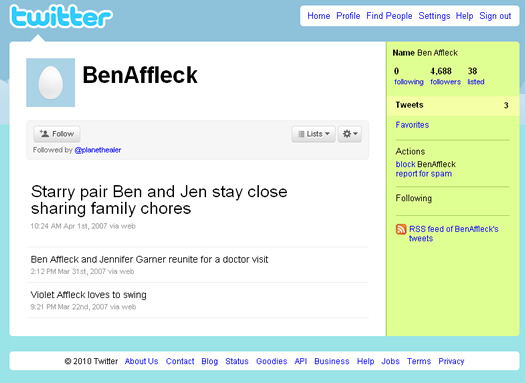
Yes, it’s crazy that Ben Affleck isn’t on Twitter, but think about how this applies to people you know (or yourself) versus a celebrity. By the way, check out how Ben’s fake Twitter account has gained over 4,600 followers. This could happen to you too (maybe not on the scale that it happened to Ben, but people searching for you could be tricked into thinking that it’s your real profile). And for the record, Ben’s PR Agency needs to get with it and secure his handle. Whoever owns the current @BenAffleck account could tweet whatever they want… That could be quite embarrassing for Ben.
The Danger of Not Being There (and Not Being Found)
Now that we’ve covered the trend of people searching for Twitter profiles, let’s explore some of the dangers of not being listed when people search for you.
1. Lack of Credibility
If someone is searching for your Twitter profile and cannot find it (or the right account), then you risk losing some credibility. For example, maybe they heard about you from a friend or colleague or maybe they just read an article or blog post of yours. Imagine they are excited to follow your updates on Twitter and then find out you’re not even there. Or they simply cannot find your account. Don’t risk losing credibility by not being on Twitter. It’s not a scary place. It’s a huge opportunity for you professionally (covered below).
2. Squatters, Impostors, and Your Reputation
This bullet could be the most dangerous for you. Reputation management has become a very hot topic in the age of Google. When people want to learn about you, they Google you. Period. So, it shouldn’t be a shock to know that some people will try and register your handle in order to control that account. They might end up doing nothing with the account, but they could end up tweeting “on your behalf.” And worse, people searching for your Twitter account will find that hijacked profile and not your own (because you’re not active on Twitter). Don’t let this happen to you. The people that contact me about Reputation Management almost always contact me after the fact. Be proactive and participate on Twitter today. You can check out my post about Twitter profile reviews to learn more about how to set up a solid profile.
3. Missed Exposure and Traffic
Let’s face it, there’s a good chance that you impressed someone if they are trying to find your Twitter account. Why make it hard for them to follow you, help you, and connect with you? That person could very well end up bringing you business, helping you personally, tweeting your articles or posts, and recommending you to friends, family, and coworkers. Don’t miss out on exposure, traffic, and recognition because you’re not active on Twitter. Register your handle, start following and connecting with people today, and post valuable updates on a regular basis. You won’t regret it. Also, learn more about the black hole of blogging and twitter before you start. This will give you realistic expectations about how the first few months will go.
4. Missed Followers
If you start on Twitter, you will inevitably want to build your follower count (the right way). You’ll quickly find out that there are quality followers and then zombie followers (or followers that aren’t active on Twitter or that don’t care about your updates). If someone is actively searching for your handle, they just might end up being a quality follower. That’s not always the case, but at least that person is showing initiative versus following hundreds or thousands of people with no specific reason for doing so (other than hoping some of those people follow them back). Don’t miss out on building your following because you’re simply not there.
5. Lost Business Opportunities
Yes, you can lose opportunities to build business, get a new job, and increase your personal brand by not being active on Twitter (and making it easy for other people to find you). By being active on Twitter, you can land new clients, connect with people in your industry, find influencers, and build your personal brand. If you want to prove how good you are, then let other people find you on Twitter and then earn their respect. Great things can happen when you do.
Help Them Find You
Whether you like it or not, there are people searching for your Twitter account. Either they’ll find your account and follow you, or they will find someone or something else. That something else could be another person with your name, a random search result unrelated to you or your business, or worse, an impostor. As Twitter surges and new technology like Google Instant makes it easier to find answers, you should make it as easy as possible for other people to find your profile. If you don’t, you could be losing credibility, losing business, and losing control of your reputation. Is that scary? Yes. But can you impact the result? Absolutely.
GG
